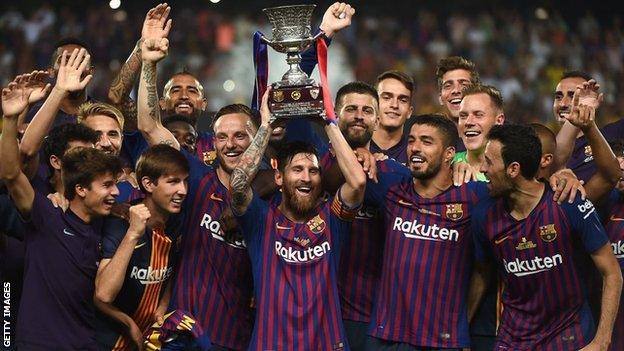Spanish Super Cup - who, why and where?
- Published

Barcelona are the Spanish Super Cup holders after beating Sevilla last season
The four-team Spanish Super Cup kicks off on Wednesday, with a potential El Clasico final on Sunday - in Saudi Arabia.
How does it work? Why have they changed it so much? BBC Sport has the answers to those questions, and more.
What has changed? What was the old format?
The Spanish Super Cup had the same format from 1982 until last year. The La Liga champions would meet the Copa del Rey winners over two legs at each club's ground before the start of the season.
In the early days double winners would automatically be given the Super Cup, but in recent years the cup runners-up would play the champions.
Last year still saw the winners of league and cup meet before the start of the season, but over one leg in Tangier, Morocco. Barcelona won the double so they met beaten Copa del Rey finalists Sevilla - and won 2-1 thanks to goals from Gerard Pique and Ousmane Dembele.
But that format has been ripped up, for the next three years at least.
The tournament now takes place in January - in Saudi Arabia - and features four teams: the top two in the previous season's La Liga, and the winners and runners-up from the Copa del Rey. If those teams are the same, then the next highest La Liga team get in.
This year the teams in action at the 62,000-capacity King Abdullah Sports City stadium in Jeddah are Barcelona, Real Madrid, Atletico Madrid and Valencia.
Valencia will take on Real Madrid on Wednesday, 8 January, with Barcelona facing Atletico Madrid the next day - both games are at 19:00 GMT (22:00 local time). The finalists meet on Sunday at 18:00 GMT.
Why is it in Saudi Arabia? Why is it not in the summer?
££. Or to be more accurate €€. Or to be even more accurate, the Saudi riyal.
The Spanish FA has not confirmed any financial details but Spanish media are reporting it is worth 40m euros (£34m) a year.
This is the latest big sporting event to be held in Saudi Arabia, following the recent Anthony Joshua-Andy Ruiz Jr boxing match, the Italian Super Cup between Juventus and Lazio last month and a friendly between Brazil and Argentina.
The kingdom has sought to stage sporting and entertainment events in a bid to attract visitors and move away from its oil-dependent economy.
The Spanish Super Cup has been moved from the summer so it does not disrupt clubs' lucrative pre-season summer tours.
Who is not happy?
Plenty of organisations and people are not happy with the decision to host the event in Saudi Arabia - a nation with many human rights issues.
The deal was only signed after Saudi Arabia agreed women would be able to attend the games.
Human rights organisation Amnesty International has highlighted the country's "abysmal" human rights record. Heavy restrictions on freedom of expression and women's rights have been raised, as has the use of the death penalty for offences not recognised as crimes under international law.
Spain's acting junior minister for sport, Maria Jose Rienda, said in November the government would not support holding the competition "in countries where women's rights are not respected".
La Liga boss Javier Tebas is angry for another reason. Broadcaster beoutQ illegally shows matches - mainly in Saudi Arabia - despite the rights to show games in the region belonging to Qatari company beIN Sports.
"Anywhere except Arabia would be best, as there they are pirating the signal of the entire football industry and world sport," said Tebas previously.
One of the teams are not happy either, although not for human rights reasons. Valencia have criticised the fact they will only earn 2m euros, compared to six million for Barcelona and Real Madrid, and three million for Atletico.
Is it on TV?
The tournament was eventually picked up by Spanish broadcasters Movistar after RTVE, Mediaset, Atresmedia and Mediapro all refused to bid because of the human rights concerns.
Royal Spanish Football Federation (RFEF) president Luis Rubiales even threatened legal action, external against RTVE, the state-owned public-service broadcaster, for not making a bid based on politics.
The games will not be broadcast anywhere in the UK unless there is a late announcement. In recent years it had been on Sky Sports.
What about ticket sales?
Spanish newspaper El Mundo says only 9% of the 12,000 tickets available to Spanish fans have been sold, with 26 Valencia fans and 50 from Atletico Madrid buying tickets.
Atletico have given those 50 fans their tickets for free - and will give them tickets for the final if they qualify.
Organisers Sela Sports say most tickets have been bought by Saudi nationals and expect all three matches at the 62,000-seater King Abdullah Sport City Stadium to be well attended.
Will players be rested?
It is hard to say for sure, because this tournament is new. But with all clubs bringing strong squads, it is likely the stars will be on show.
However, Gareth Bale and Karim Benzema are both missing for Real Madrid because of injury, and Barcelona goalkeeper Marc-Andre ter Stegen is also sidelined.
The travelling is not ideal for any of the clubs, but they will not have any La Liga games to catch up on when they get back, as there is a break in the league until 17 January.
Copa del Rey games are currently taking place, but the four Super Cup teams have a bye to the last 32.